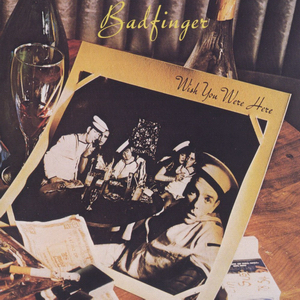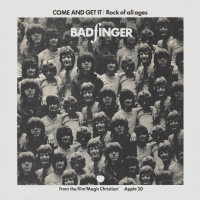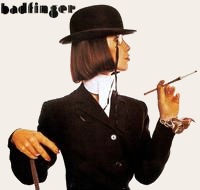
Badfinger were a Welsh rock band formed in 1961 in Swansea. Their best-known lineup consisted of Pete Ham (guitar), Mike Gibbins (drums), Tom Evans (bass), and Joey Molland (guitar). They are recognised for their influence on the 1970s power pop genre. It is estimated that the band sold 14 million records.

No Dice is the third studio album by British rock band Badfinger, issued by Apple Records and released on 9 November 1970. Their second album under the Badfinger name, but their first official album under that name, and first to include guitarist Joey Molland, No Dice significantly expanded the British group's popularity, especially abroad. The album included both the hit single "No Matter What" and the song "Without You", which would become a big hit for Harry Nilsson, and later a hit for Mariah Carey.

Straight Up is the fourth studio album by the Welsh rock band Badfinger, released in December 1971 in the United States and February 1972 in Britain. Issued on the Beatles' Apple record label, it includes the hit singles "Day After Day" and "Baby Blue", and the similarly popular "Name of the Game", all of which were written by singer and guitarist Pete Ham. The album marked a departure from the more rock-oriented sound of Badfinger's previous releases, partly as a result of intervention by Apple Records regarding the band's musical direction.
"Without You" is a song written by Pete Ham and Tom Evans of British rock group Badfinger, and first released on their 1970 album No Dice. The power ballad has been recorded by over 180 artists, and versions released as singles by Harry Nilsson (1971), T. G. Sheppard (1983) and Mariah Carey (1994) became international best-sellers. The Nilsson version was included in 2021's Rolling Stone's 500 Greatest Songs of All Time. Paul McCartney once described it as "the killer song of all time".

Robert Jackson is an English rock musician most famous for being a member of Badfinger from 1974-75 and 1981-83, and of The Fortunes from 1995-2018. He currently tours under the name Badfinger in the United Kingdom.

Wish You Were Here is the seventh studio album by rock band Badfinger and their third consecutive album produced by Chris Thomas. It was recorded in the spring of 1974 at Colorado's Caribou Ranch and released in November of that year on Warner Bros. Records. Wish You Were Here was the second and last album the band released on the Warner Bros. label.

"Come and Get It" is a song composed by English singer-songwriter Paul McCartney for the 1969 film The Magic Christian. The song was performed by Badfinger, produced by McCartney and issued as a single 5 December 1969 in the UK, and 12 January 1970 in the US, on the Beatles' Apple label. It was the band's first release under the Badfinger name and was their international breakthrough, hitting the top 10 in both the UK and US singles charts.

Badfinger is the sixth studio album by British rock band Badfinger. The album was recorded in autumn 1973 and released in 1974 on Warner Bros. Records. It was the first of two albums released by the band on the Warner label. The cover art for the album shows a woman wearing a riding outfit and hat from the 1920s and smoking a cigarette in a cigarette holder.

Say No More is the ninth studio album recorded by British rock band Badfinger that contained new material. Issued in January 1981 on Radio Records, the LP was the second and last reunion by Tom Evans and Joey Molland, after the suicide of band founder Pete Ham in 1975. The album was recorded in Miami, Florida, by Evans, Molland, pianist and organist Tony Kaye, guitarist Glen Sherba and drummer Richard Bryans and was co-produced by Jack Richardson.

Thomas Evans was an English musician. He is best known for his work as the bassist of the band Badfinger.

"Day After Day" is a song by the British rock band Badfinger from their 1971 album Straight Up. It was written by Pete Ham and produced by George Harrison, who also plays slide guitar on the recording. The song was issued as a single and became Badfinger's biggest hit, charting at number 4 in the United States and number 10 in the UK, ultimately earning gold accreditation from the Recording Industry Association of America.

"Rock On" is a song written by English singer David Essex. Recorded in 1973 and released as a single by Essex, it became an international hit. In 1989, American actor and singer Michael Damian recorded a cover version that went to number one on the Billboard Hot 100 chart. The song has been recorded many times, including a 2006 version by the English hard rock group Def Leppard.

BBC in Concert 1972–1973 is a CD of live recordings by the British rock group Badfinger released in 1997 by Strange Fruit Records and then re-released in 2000 by Fuel 2000 Records. The recordings were made for the BBC in 1972 and 1973, in two separate concerts at the Paris Theatre in London. The album also includes a 1970 BBC recording of Badfinger's first Top 10 hit, "Come and Get It".

"Baby Blue" is a song by Welsh rock band Badfinger from their fourth studio album, Straight Up (1971). The song was written by Pete Ham, produced by Todd Rundgren, and released on Apple Records. As a single in the US in 1972, it went to #14. In 2013, the song was prominently featured in the series finale of the television show Breaking Bad. As a result, the song charted in the UK for the first time, reaching #73.

"Maybe Tomorrow" is a song composed and sung by guitarist Tom Evans of The Iveys, which was released as the group's first worldwide single on Apple Records. It also served as the title track for the album Maybe Tomorrow, and it was also included on the Badfinger album Magic Christian Music released in 1970.

"Apple of My Eye" is a song recorded by the rock/pop band Badfinger for inclusion on their 1973 album, Ass. The song was written and sung by Pete Ham, produced by Chris Thomas and Badfinger, and released on Apple Records.

"I Miss You" is a song by the British power pop band, Badfinger. Written by Pete Ham for their first Warner Bros. LP (Badfinger), it served as the opening track and sole U.S. single for said album.

"Lost Inside Your Love" is a song by the British power pop band Badfinger. Written by bassist Tom Evans, "Lost Inside Your Love" was the third track on the band's 1979 album, Airwaves.

"Love Is Gonna Come at Last" is a song by the British power pop band Badfinger. Written by guitarist Joey Molland, "Love Is Gonna Come at Last" appeared on the band's 1979 album, Airwaves.
"Meanwhile Back at the Ranch"/"Should I Smoke" is a medley released by the British power pop band Badfinger. The song was the closing track on their critically acclaimed but commercially unsuccessful album, Wish You Were Here. "Meanwhile Back at the Ranch" was written by Pete Ham, while "Should I Smoke" was penned by Joey Molland.



















